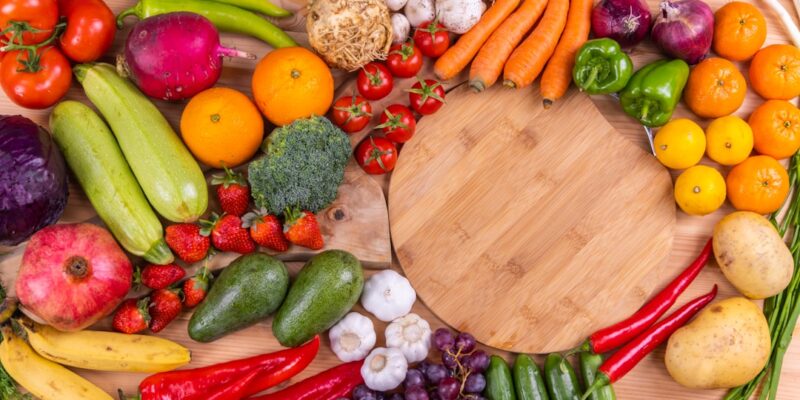
Master the Art of Healthy Eating: Explore the Top Nutrition Books for Foodies
Nutrition plays a crucial role in maintaining a healthy lifestyle. It provides our bodies with the necessary nutrients, vitamins, and minerals to function properly and stay in optimal health. A well-balanced diet can help prevent chronic diseases, boost our immune system, improve our mood, and increase our energy levels. However, with so much information available, it can be overwhelming for beginners to navigate the world of nutrition. That’s why we have compiled a comprehensive guide to the top nutrition books for beginners, as well as tips and recipes to help you make nutritious meals at home.
Key Takeaways
- Nutrition is a crucial component of a healthy lifestyle.
- Beginner-friendly nutrition books can provide a comprehensive guide to healthy eating.
- Understanding macronutrients is essential for building a healthy diet.
- Plant-based eating can offer numerous health benefits, and vegan and vegetarian cookbooks can help explore this lifestyle.
- Superfoods can provide optimal health benefits and should be incorporated into a healthy diet.
The Top Nutrition Books for Beginners: A Comprehensive Guide
1. “The Omnivore’s Dilemma” by Michael Pollan: This book explores the complex web of food choices we face in today’s world and encourages readers to make more informed decisions about what they eat. It delves into the industrial food system, organic farming, and the impact of our food choices on the environment.
2. “In Defense of Food” by Michael Pollan: In this book, Pollan breaks down the confusion surrounding nutrition and offers simple guidelines for healthy eating. He emphasizes the importance of whole foods and encourages readers to focus on quality rather than quantity.
3. “Food Rules” by Michael Pollan: This book provides practical advice on how to eat well in today’s fast-paced world. It offers 64 simple rules for healthy eating, such as “Eat food, not too much, mostly plants” and “Avoid food products that contain ingredients no ordinary human would keep in the pantry.”
Understanding Macronutrients: The Building Blocks of a Healthy Diet
Macronutrients are the three main components of our diet that provide us with energy: carbohydrates, proteins, and fats.
1. Carbohydrates: Carbohydrates are our body’s primary source of energy. They can be found in foods such as grains, fruits, vegetables, and legumes. The recommended daily intake of carbohydrates varies depending on factors such as age, sex, and activity level. However, it is generally recommended that carbohydrates make up 45-65% of our daily caloric intake.
2. Proteins: Proteins are essential for building and repairing tissues, as well as for the production of enzymes and hormones. Good sources of protein include meat, fish, poultry, dairy products, legumes, and nuts. The recommended daily intake of protein is around 0.8 grams per kilogram of body weight.
3. Fats: Fats are important for providing energy, insulating our organs, and helping our bodies absorb fat-soluble vitamins. Healthy sources of fats include avocados, nuts, seeds, olive oil, and fatty fish. It is recommended that fats make up 20-35% of our daily caloric intake.
The Benefits of Plant-Based Eating: Exploring Vegan and Vegetarian Cookbooks
A plant-based diet has been shown to have numerous health benefits, including a reduced risk of chronic diseases such as heart disease, diabetes, and certain types of cancer. It is also more environmentally sustainable than a diet high in animal products.
1. “Thug Kitchen: Eat Like You Give a F*ck” by Thug Kitchen: This cookbook offers a fun and irreverent take on plant-based eating. It provides over 100 recipes that are easy to follow and packed with flavor.
2. “Oh She Glows” by Angela Liddon: This cookbook features over 100 vegan recipes that are both healthy and delicious. It includes a wide variety of dishes, from breakfasts and snacks to main courses and desserts.
3. “The Plant-Based Diet for Beginners” by Gabriel Miller: This book provides a comprehensive guide to transitioning to a plant-based diet. It includes meal plans, shopping lists, and tips for eating out.
The Power of Superfoods: Discovering the Best Ingredients for Optimal Health
Superfoods are nutrient-dense foods that are rich in vitamins, minerals, and antioxidants. They have been shown to have numerous health benefits, including boosting our immune system, reducing inflammation, and improving our overall well-being.
1. Blueberries: Blueberries are packed with antioxidants and have been shown to improve brain function and reduce the risk of heart disease.
2. Kale: Kale is a leafy green vegetable that is rich in vitamins A, C, and K, as well as fiber and antioxidants. It has been shown to have anti-inflammatory properties and may help protect against certain types of cancer.
3. Quinoa: Quinoa is a gluten-free grain that is high in protein and fiber. It is also a good source of iron, magnesium, and phosphorus.
Cooking for Health: Tips and Tricks for Making Nutritious Meals at Home
Cooking healthy meals at home is a great way to take control of your nutrition and ensure that you are getting the nutrients your body needs. Here are some tips for cooking healthy meals at home:
1. Plan your meals: Take some time each week to plan out your meals and make a shopping list. This will help you stay organized and ensure that you have all the ingredients you need.
2. Prep ahead of time: Spend some time on the weekends prepping ingredients for the week ahead. Chop vegetables, cook grains, and marinate proteins so that they are ready to go when you need them.
3. Experiment with flavors: Don’t be afraid to try new spices and herbs to add flavor to your dishes. This will make your meals more enjoyable and help you stick to a healthy eating plan.
The Connection Between Nutrition and Mental Health: Books to Boost Your Mood and Brainpower
There is a growing body of research that suggests a strong link between nutrition and mental health. Eating a healthy diet can help improve our mood, reduce symptoms of depression and anxiety, and boost our brainpower.
1. “The Happiness Diet” by Tyler Graham and Drew Ramsey: This book explores the connection between nutrition and mental health. It provides practical advice on how to eat for optimal brain health and includes recipes that are designed to boost your mood.
2. “The Mind-Gut Connection” by Emeran Mayer: This book explores the connection between our gut health and our mental health. It provides insights into how our diet can impact our mood and offers practical tips for improving gut health.
3. “The Brain Warrior’s Way Cookbook” by Daniel G. Amen and Tana Amen: This cookbook provides recipes that are designed to support brain health. It includes dishes that are rich in nutrients that are important for brain function, such as omega-3 fatty acids, antioxidants, and vitamins.
The Science of Weight Loss: Shedding Pounds the Healthy Way
Losing weight is a common goal for many people, but it’s important to approach weight loss in a healthy and sustainable way. Crash diets and extreme calorie restriction can be harmful to our bodies and often lead to weight regain in the long run.
1. Eat a balanced diet: Focus on eating a variety of nutrient-dense foods, including fruits, vegetables, whole grains, lean proteins, and healthy fats. This will help ensure that you are getting all the nutrients your body needs while still creating a calorie deficit for weight loss.
2. Portion control: Pay attention to portion sizes and try to eat until you are satisfied, not overly full. Use smaller plates and bowls to help control portion sizes.
3. Stay active: Incorporate regular physical activity into your routine to help burn calories and build muscle. Aim for at least 150 minutes of moderate-intensity exercise or 75 minutes of vigorous-intensity exercise per week.
Navigating Food Allergies and Sensitivities: Cookbooks for Special Diets
Food allergies and sensitivities can make it challenging to find recipes that meet your dietary needs. Fortunately, there are many cookbooks available that cater to special diets.
1. “The Allergy-Free Pantry” by Colette Martin: This cookbook provides recipes that are free from the top eight allergens, including wheat, dairy, eggs, nuts, and soy. It also includes tips for stocking an allergy-free pantry.
2. “The Gluten-Free Almond Flour Cookbook” by Elana Amsterdam: This cookbook focuses on gluten-free recipes that use almond flour as a substitute for wheat flour. It includes a wide variety of dishes, from breakfasts and snacks to main courses and desserts.
3. “The Dairy-Free Kitchen” by Ashley Adams: This cookbook provides recipes that are free from dairy products. It includes dishes such as dairy-free mac and cheese, dairy-free ice cream, and dairy-free cheesecake.
Sustainable Eating: How to Make Healthy Choices for Yourself and the Planet
Sustainable eating is not only good for our health but also for the planet. By making conscious choices about the food we eat, we can reduce our carbon footprint and help protect the environment.
1. Eat local and seasonal: Choose foods that are grown locally and in season. This reduces the energy required for transportation and supports local farmers.
2. Reduce food waste: Plan your meals and only buy what you need. Use leftovers creatively and compost food scraps.
3. Choose sustainable seafood: Opt for seafood that is sustainably sourced and avoid species that are overfished or caught using destructive fishing methods.
In conclusion, nutrition is a key component of maintaining a healthy lifestyle. By understanding macronutrients, exploring plant-based eating, incorporating superfoods into our diet, cooking nutritious meals at home, and making sustainable food choices, we can improve our overall health and well-being. The recommended books and recipes provided in this comprehensive guide are a great starting point for beginners looking to enhance their nutrition knowledge and make positive changes in their diet. So, why not give them a try and embark on a journey towards a healthier you?
FAQs
What is the article about?
The article is about exploring the top nutrition books for foodies to master the art of healthy eating.
Why is healthy eating important?
Healthy eating is important because it provides the body with essential nutrients to function properly, helps maintain a healthy weight, reduces the risk of chronic diseases, and improves overall well-being.
What are some popular nutrition books for foodies?
Some popular nutrition books for foodies include “The Omnivore’s Dilemma” by Michael Pollan, “In Defense of Food” by Michael Pollan, “The China Study” by T. Colin Campbell, and “How Not to Die” by Michael Greger.
What can I learn from these nutrition books?
These nutrition books provide insights into the food industry, the impact of food on health, and practical tips for healthy eating. They also offer recipes and meal plans to help readers incorporate healthy eating habits into their daily lives.
Are these nutrition books suitable for beginners?
Yes, these nutrition books are suitable for beginners as they provide a comprehensive understanding of healthy eating and offer practical tips for incorporating healthy habits into daily life.
Where can I find these nutrition books?
These nutrition books can be found at local bookstores, online retailers, and public libraries.


















